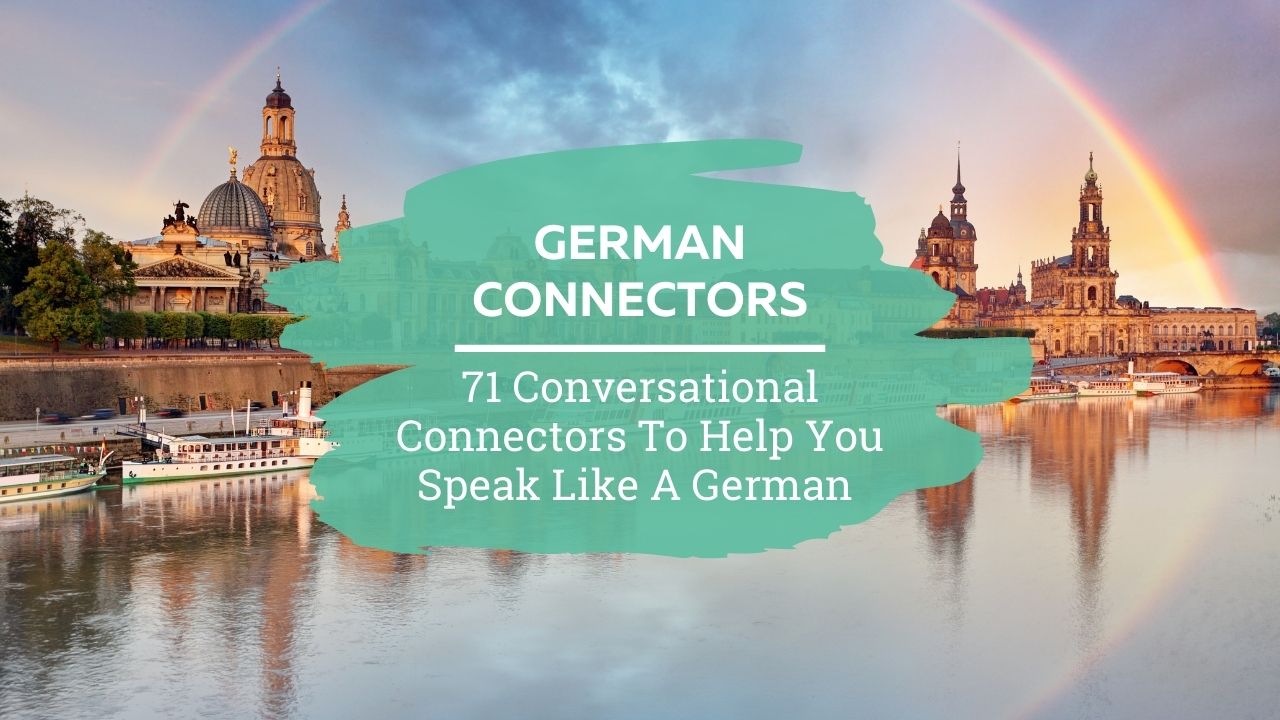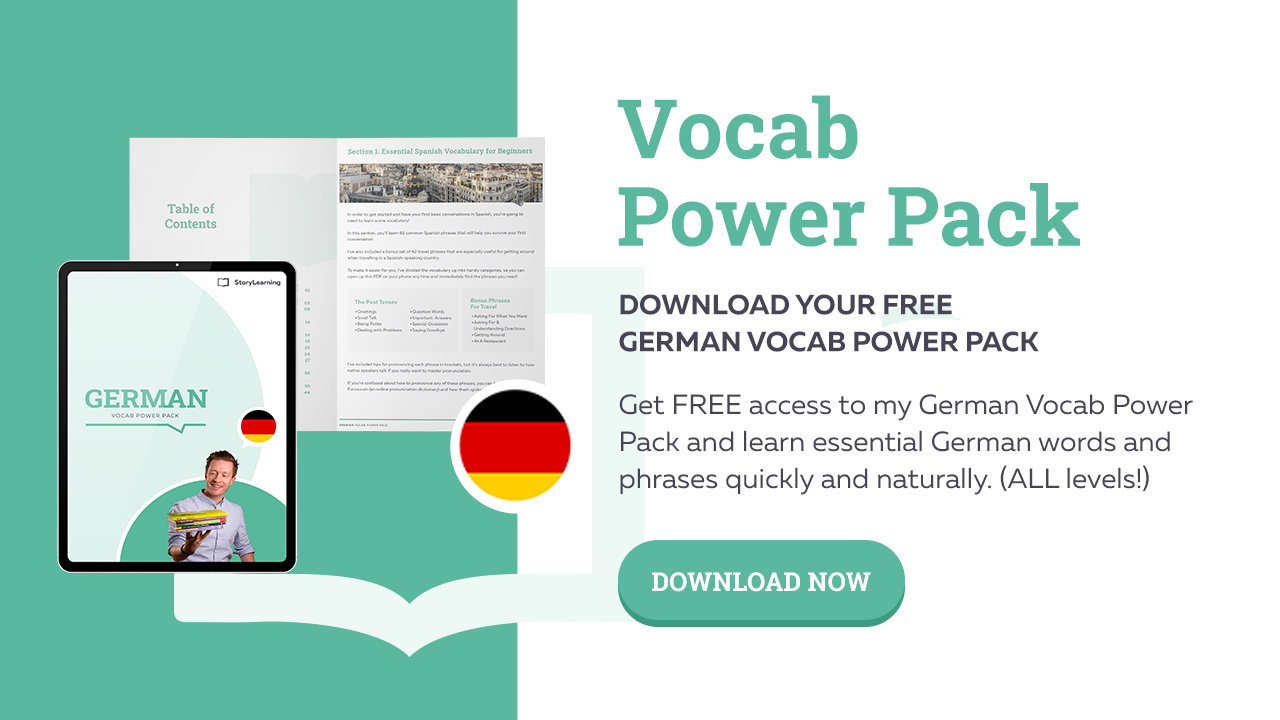Learning German and want to sound more fluent? Conversational sentence connectors in German or German conjunctions allow your ideas to flow together smoothly and naturally.
Let's examine a few English examples first so that you can understand what conjunctions in German are. Here's a paragraph without connectors:
This year, I'm planning a vacation. I really look forward to the vacation. There are still details that need to be ironed out. I still need to pack. We have to rent a car. There are limited vehicles available. I'd prefer to plan earlier. We'll have to make the best out of the situation.
Conversational connectors, usually conjunctions, are transitional words that enable us to combine dependent clauses into complete sentences, like this:
This year, I'm planning a vacation, and I really look forward to it. However, there are still a few details that need to be ironed out in addition to packing. We have to rent a car, but there are limited vehicles available. In the future, I'd prefer to plan earlier. Meanwhile, we'll have to make the best out of the situation.
The bolded words above are conjunctions in German that link short, related phrases together into one long sentence. These words allow a conversation to flow more naturally and help you sound more fluent in the German language.
Pro Tip
By the way, if you want to learn German fast and have fun while doing it, my top recommendation is German Uncovered which teaches you through StoryLearning®.
With German Uncovered you’ll use my unique StoryLearning® method for learning German grammar naturally through story… not rules. It’s as fun as it is effective.
If you’re ready to get started, click here for a 7-day FREE trial.

Table of Contents
What Are German Conversational Connectors?

German conjunctions or connectors can include adverbs, German coordinating conjunctions, subordinating German conjunctions, and prepositions that enable a smooth transition between ideas in a sentence.
German coordinating conjunctions are linking words that keep the normal word order of sentences. The verbs in both phrases stay in the same position.
Example: Ich putze mir die Zähne und geheins Bett. (I'm brushing my teeth and going to bed.)
In this case, und is the German conjunction.| German Coordinating Conjunctions | Meaning |
| und | and |
| oder | or |
| aber | but |
| denn | because |
| sondern | but rather |
| doch, jedoch | but, however |
| beziehungsweise | respectively |
On the other hand, German subordinating conjunctions send the conjugated verb in the second clause to the end of the sentence.
Example: Ich putze mir die Zähne, weil ich ins Bett gehe. (I'm brushing my teeth because I'm going to bed.)
| German Subordinating Conjunctions | Meaning |
| wenn | if, whenever |
| bevor | before |
| nachdem | after |
| als | when |
| bis | until |
| weil | because |
| falls | in case |
| dass | that |
There are many more German subordinating conjunctions.You'll recognize subordinating conjunctions when you see the conjugated verb at the end of a sentence.
71 German Conjunctions

First, let's look at the most frequently-used conversational connectors in German. These words are common in daily speech and can instantly improve your fluency.
#1 Aber – But
- Example: Sie möchten ins Kino gehen, aber sie haben kein Geld. (They want to go to the movies, but don't have any money.)
#2 Denn – Because
- Example: Du gehst in die Schule, denn du willst lernen. (You go to school because you want to learn.)
#3 Doch – After All, But
- Example: Das hat er doch gesagt. (He did say that (after all))
#4 Natürlich – Naturally, Of Course
- Example: Natürlich wünsche ich mir ein großes Haus (Of course I wish for a big house.)
#5 Obwohl – Although, Even Though
- Example: Er möchte draußen spielen, obwohl es regnet. (He wants to play outside, even though it's raining.)
#6 Sonst – Otherwise, Or
- Example: Sei freundlich, sonst gehe ich. (Be friendly, otherwise I'll leave.)
#7 Weil – Because
- Example: Wir gehen nach Hause, weil es spät ist. (We are going home because it's late.)
#8 Zum Beispiel – For Example
- Example: Welche Gemüse magst du, zum Beispiel? (Which vegetables do you like, for example.)

Speak Like A Native With These German Conjunctions Of Time

Adding specifics about when something happens can jazz up your German sentences immensely. Another benefit of describing when an event occurs is that it can help others understand the context of what you want to say.
#9 Am Anfang, Anfangs – At First, At the Beginning
- Example: Am Anfang (Anfangs) war alles einfach. (At first, everything was easy.)
#10 Am Ende, Endlich, Zum Schluss, Schließlich – Lastly, Finally, In the End
- Example: Am Ende (Endlich, Zum Schluss, Schließlich) habe ich viel gelernt. (In the end, I learned a lot.)
#11 Auf Einmal – Suddenly, At Once
- Example: Auf einmal kam unser Lehrer. (Suddenly, our teacher came.)
#12 Bald – Soon, Shortly
- Example: Sie geht bald ins Bett. (She's going to bed soon.)
#13 Bisher – Up Until Now, So Far
- Example: Bisher waren wir immer pünktlich. (So far, we were always on time.)
#14 Damals – Back Then
- Example: Das waren gute Zeiten damals. (Those were good times back then.)
#15 Danach – After, Afterward
- Example: Ich muss arbeiten, danach können wir tanzen gehen. (Ich habe to work, afterward we can go dancing.)
#16 Dann – Then
- Example: Morgens futtern wir die Tiere, dann frühstücken wir. (Mornings we feed the animals, then we eat breakfast.)
#17 Eher – More Likely, Rather
- Example: Ich glaube, das Wetter wird morgen eher schlecht. (I think the weather is more likely to be bad tomorrow.)
#18 Früher, Vorher – Back Then, Earlier, Previously
- Example: Früher (Vorher) hat er als Musiker gearbeitet. (He previously worked as a musician.)
#19 Gleichzeitig, Zur Gleichen Zeit – At the Same Time, Simultaneously
- Example: Ich kann gleichzeitig (zur gleichen Zeit) singen und tanzen. (I can sing and dance simultaneously.)
#20 Immer Noch – Still
- Example: Liebst du mich immernoch? (Do you still love me?)
#21 In der Zukunft, Zukünftig – In The Future
- Example: Wir wollen zukünftig (in der Zukunft) umziehen. (We want to move in the future.)
#22 Inzwischen – Meanwhile, In The Meantime
Inzwischen implies a recent change in circumstances.
- Example: Ich habe mich inzwischen anders entschieden. (I made a different decision in the meantime.)
#23 Jetzt – Now
- Example: Er hat jetzt vier Tage Urlaub. (He has four days of vacation now.)
#24 Mittlerweile, Unterdessen – Meanwhile, For The Time Being
- Example: Mittlerweile geht's mir besser. (For the time being, I feel better.)
#25 Nachdem – After
- Example:Nachdem ich Deutsch gelernt habe, wollte ich eine dritte Sprache lernen. (After I learned German, I wanted to learn a third language.)
#26 Nachher – Later, Afterward
- Example: Wir können nachher putzen. (We can clean later.)
#27 Neulich – Recently
- Example: Ich habe neulich eine Abkürzung entdeckt. (I recently discovered a shortcut.)
#28 Noch – Still
- Example: Sie hat noch genug Geld. (She still has enough money.)
#29 Plötzlich – Suddenly
- Example: Plötzlich haben wir ein Geräusch gehört. (Suddently, we heard a noise.)
#30 Schließlich – Eventually, After All, Ultimately
- Example: schließlich haben sie uns nicht eingeladen. (Ultimately, they didn't invite us.)

#31 Seitdem, Seither – Since Then
- Example: Wir sehen die beiden selten seitdem sie heirateten. (We see the two rarely since they got married.)
#32 Sobald – As Soon As
- Example: Sobald ich Deutsch lerne, fliege ich nach Deutschland! (As soon as I learn German, I'm flying to Germany!)
#33 Vor Kurzem – Recently, Lately
- Example: Ich habe deine Tochter vor kurzem gesehen. (I recently saw your daughter.)
#34 Zuerst – First, At First
- Example: Zuerst lesen wir das Buch, und dann machen wir die Übungen. (First, we're reading the book, and then we'll do the exercises.)
#35 Zuletzt – At the End, Last
- Example: Zuletzt kommt der Nachtisch. (At the end comes the dessert.)
#36 Zum Ersten/Zweiten Mal – For The First/Second Time
- Example: Er war 19 als er zum ersten mal Berlin besucht hat. (He was 19 when he visited Berlin for the first time.)
#37 Zunächst – For Now, First of All
- Example: Lass uns zunächst was anderes tun. (Let's do something else for now.)
German Connectors To Express Your Opinions

Many conversations require you to state your opinion instead of just the raw facts. The German sentence connectors below can help you when you need to say what's on your mind.
#38 Auf der anderen Seite, Andererseits – On The Other Hand
- Example: Es ist schade, aber andererseits (auf der anderen Seite) nicht verwunderlich. (It's a shame, but on the other hand not surprising.)
#39 Auf der einen Seite, Einerseits – On The One Hand
- Example: Einerseits (Auf der einen Seite) kann ich deine Entscheidung verstehen. (On the one hand I can understand your decision.)
#40 Auf jeden Fall, Jedenfalls – Definitely, In Any Case
- Example: Wir können auf jeden Fall (jedenfalls) am Samstag treffen. (We can definitely meet on Saturday.)
#41 Aus diesem Grund – For This Reason
- Example: Aus diesem Grund habe ich die deutsche Sprache studiert. (For this reason, I studied the German language.)
#42 Es scheint mir, dass – It Seems To Me That…
- Example: Es scheint mir, dass dein Deutsch viel besser ist. (It seems to me that your German is much better.)
#43 Sozusagen – So To Speak, In A Matter Of Speaking
- Example: Ich habe sozusagen meine Schwiegermutter gleich mit geheiratet. (I married my mother-in-law at the same time, so to speak.)
German Connecting Words To Transition Topics

Sometimes, you need to form a connection between two similar or different topics. The linking words below can add emphasis to your sentence transitions.
#44 Also – Hence, So
- Example: Ich habe meine Schlüssel vergessen, also bin ich zu spät gekommen. (I forgot my keys, so I was late.)
#45 Außerdem – In Addition, Besides
- Example: Er braucht außerdem noch viel aufmerksamkeit. (In addition, he needs a lot of attention.)
#46 Beispielsweise, Zum Beispiel – For Example
- Example: Ich habe zum Beispiel (beispielsweise) Mathe, Deutsch, und Chemie Unterricht. (I have for example, math, German, and chemistry class.)
#47 Das Heißt – That Means
- Example: Das heißt, du kommst morgen nicht? (That means you're not coming tomorrow?)
#48 Deshalb, Deswegen – That's Why
- Example: Deswegen ist er im Krankenhaus. (That's why he's in the hospital.)
#49 Ganz im Gegenteil – On The Contrary
- Example: Ich streite nicht mit dir, ganz im Gegenteil. (I'm not arguing with you; on the contrary.)
#50 Immerhin – After All, At Least
- Example: Immerhin hat sie sich entschuldigt. (At least she apologized.)
#51 Wobei – Whereby
While the connecting word dabei implies that one action results from another, the word wobei indicates when two events coincide.
- Example: Das Essen war lecker, wobei ich sagen muss, dass es sehr teuer war. (The food was delicious, whereby it was very expensive.)
#52 Zumindest – At Least
- Example: Kannst du zumindest versuchen? (Can you at least try?)

Improve Your German With These Connectors

When you write in German, especially for academic purposes, you'll need more formal connectors.
The linking words below can help you sound more fluent in German business correspondence and educational settings, where a distinct formality level is required.
#53 Daher, Darum – Therefore, Because Of That
- Example: Daher (Darum) mussten wir vier Stunden warten. (Therefore (Because of that), we had to wait four hours.)
#54 Daraufhin – Consequently, Subsequently, With Regard To
- Example: Ihre Anfrage wird daraufhin an die entsprechenden Mitarbeiter weitergeleitet. (Your order will subsequently be forwarded to the appropriate employees.)
#55 Darüber Hinaus – Furthermore, In Addition
- Example: Darüber hinaus ist es wichtig, pünktlich zu sein. (Furthermore, it's important to be on time.)
#56 Dennoch, Jedoch – Nevertheless, Yet, Still
Both dennoch and jedoch are a more formal way of saying trotzdem and add sophistication to your German story-telling.
- Example: Wir haben uns dennoch verliebt. (We fell in love nevertheless.)
#57 Im Wesentlichen – Essentially, Fundamentally
- Example: Dies ist im Wesentlichen die Ursache des Problems. (This is essentially the cause of the problem.)
#58 Indessen – Meanwhile
- Example: Sie machte sich indessen auf den Rückweg. (Meanwhile, she started on the way back.)
#59 Stattdessen – Instead
Anstatt is used to mean “instead of,” whereas stattdessen corresponds to “instead.”
- Example: wegen des schlechten Wetters mussten wir stattdessen zu Hause bleiben. (Because of bad weather, we had to stay home instead.)
German Connecting Words To Add Emphasis

In some cases, you want to emphasise a particular action or emotion in your sentence. Using the following linking words, you can let other German speakers know exactly how you feel about a situation. Here are some other conjunctions to get you sounding fluent in no time:
#60 Eben, Gerade – Just
- Example: Ich habe eben (gerade) die Wäsche aufgehängt. (I just hung up the laundry.)
#61 Einmal – Once
- Example: Wir haben einmal auf einem Bauernhof gelebt. (We lived on a farm once.)
#62 Erst – Only
- Example: Meine Mutter kommt erst am Sonntag. (My mother is only coming Sunday.)
#63 Grundsätzlich – Basically
- Example: Alles ist grundsätzlich gleich geblieben. (Everything has basically stayed the same.)
#64 Im Großen und Ganzen – Overall
- Example: Im großen und ganzen würde ich sagen, dass wir gute Arbeit geleistet haben. (Overall, I'd say we did a good job.)
#65 Kurz Gesagt – In A Nutshell
- Example: Kurz gesagt, es war eine sehr lange Reise. (In a nutshell, it was a very long trip.)
#66 Tatsächlich – Actually, Really
- Example: Hast du tatsächlich im Lotto gewonnen? (Did you really win the lottery?)
#67 Trotzdem – Nevertheless, Nonetheless
- Example: Du verdienst trotzdem eine zweite Chance. (You deserve a second chance nonetheless.)
#68 Übrigens – By The Way
- Example: Ich habe übrigens eine neue Telefonnummer. (By the way, I have a new phone number.)
#69 Weiter – Further
- Example: Können Sie mir weiter helfen? (Can you assist me further?)
#70 Wenigstens – At Least
- Example: Sie muss noch wenigstens drei Stunden lernen. (She still has to learn for at least 3 more hours.)
#71 Zumeist – Mostly
- Example: Er ist zumeist pessimistisch. (He is mostly pessimistic.)

FAQs About German Conjunctions
What are the conjunctions in German?
Conjunctions are words that connect clauses for smoother transitions and fluid speech. There are coordinating conjunctions and subordinating conjunctions.
Coordinating conjunctions link clauses while maintaining the standard word order in both halves of the sentence. For example, Ich trinke Kaffee und esse Kuchen (I drink coffee and eat cake).
und (and)
oder (or)
aber (but)
denn (because)
sondern (but rather)
doch, jedoch (but, however)
beziehungsweise (respectively)
Subordinating conjunctions send the conjugated verb of the dependent clause to the end of the sentence. For instance, Ich bleibe zu Hause, weil es regnet (I’m staying home because it’s raining).
wenn (if, whenever)
bevor (before)
nachdem (after)
als (when)
bis (until)
weil (because)
falls (in case)
dass (that)
Do German verbs always come after conjunctions?
No, German verbs do not always come directly after conjunctions. The placement of the verb depends on the type of conjunction used:
Coordinating Conjunctions – the word order in both clauses remains the same as if the clauses were independent.
For example, in the sentence Ich lese ein Buch und trinke Tee (I’m reading a book and drinking tea), the verb trinke is in the second position and follows the subject directly, just as it would if they were two independent sentences.
Subordinating Conjunctions – the verb in the dependent clause is sent to the end. For example, Ich komme nicht, weil ich krank bin (I’m not coming because I’m sick), where bin (am) is at the end of the clause.
The verb position is a key grammatical rule in German and is crucial for constructing correct sentences.
What are the connectors in German?
Connectors in German are words or phrases that help to link sentences and ideas together, making your speech or writing more cohesive.
These include conjunctions, but also extend to certain adverbs and phrases that serve a similar function.
Examples of German connectors:
Also (so, therefore): Ich habe keine Zeit, also muss ich absagen (I don’t have time, so I have to cancel).
Deshalb (that’s why): Er hat viel gelernt, deshalb hat er bestanden (He studied a lot, that’s why he passed).
Trotzdem (nevertheless): Es war kalt, trotzdem gingen wir spazieren (It was cold, nevertheless we went for a walk).
Connectors transition between thoughts and are useful in spoken and written German.
When to use um zu in German?
The phrase um zu in German is used to express purpose or intention. The English equivalent is “in order to.” Always use an infinitive verb after “zu.”
Ich gehe früh ins Bett, um morgen fit zu sein (I’m going to bed early in order to be fit tomorrow).
Ich spare Geld, um ein neues Auto zu kaufen (I’m saving money in order to buy a new car).
The subject performing the action in both clauses must be the same.
What is the difference between Aber and Sondern?
In German, “aber” and “sondern” both mean “but” in English. However, you use them in different contexts.
Aber is a general contrast word, used like “but” in English. Whereas sondern comes after a negation to introduce a correction or alternative.
Ich bin müde, aber ich gehe noch zur Party. (I am tired, but I am still going to the party.)
Ich bin nicht müde, sondern hungrig. (I am not tired, but hungry.)
How to use obwohl in German?
Obwohl is a subordinating conjunction in German that means “although” or “even though” in English. It introduces a subordinate clause that expresses a contrast or contradiction to the main clause.
Ich gehe spazieren, obwohl es regnet. (I am going for a walk, although it is raining.)
Obwohl es regnet, gehe ich spazieren. (Although it is raining, I am going for a walk.)
Note that you can put obwohl in the middle or at the beginning of the sentence, but the word order changes.
German Connectors: The Fast Way To Improve Your German Language Skills

By starting to incorporate German conjunctions into your sentences, you'll be able to express your thoughts with greater accuracy and sound more fluent at the same time.
Add these German conjunctions to your German vocabulary, and you're sure to turn the heads of native speakers. Best of all, you can add connectors to your sentences without any drastic grammatical changes.
I hope this list helps accelerate your learning process as you practice listening to and reading the German language. You can acquire these words faster by paying attention to how native speakers use them in sentences.

Olly Richards
Creator of the StoryLearning® Method
Olly Richards is a renowned polyglot and language learning expert with over 15 years of experience teaching millions through his innovative StoryLearning® method. He is the creator of StoryLearning, one of the world's largest language learning blogs with 500,000+ monthly readers.
Olly has authored 30+ language learning books and courses, including the bestselling "Short Stories" series published by Teach Yourself.
When not developing new teaching methods, Richards practices what he preaches—he speaks 8 languages fluently and continues learning new ones through his own methodology.











































